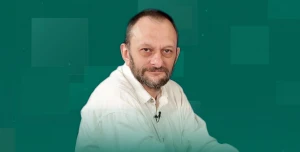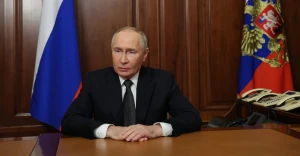
Yermak's government. How West and society failed to appreciate changes in Ukrainian government
President Volodymyr Zelenskyy has reshuffled nearly half of the government. However, decisive reforms and major breakthroughs are unlikely, as many of the new ministers are former deputies of Andriy Yermak or his classmates
Why did the president need these changes? Western media outlets, such as the Economist, suggest that he did so because of his declining popularity.
In sociology, people's love for the president is melting like March snow. According to a poll by the Rating Group, in the first six months of 2024, the figure for support fell from 69% to 54%.
Denys Shmyhal remained Prime Minister in the improved government. Notably, he did not comment on the changes, the appointees, or what these shifts might mean for the country during the war. This new mix of ministers can hardly be called a government of national unity or technocrats suited for challenging times. Most of the new appointees are either unknown to the public or are only slightly recognizable due to personal connections with Yermak. The appointments of Mykola Tochytskyi as Minister of Culture and Andrii Sybiha as Minister of Foreign Affairs drew attention, with headlines labeling them as “classmates of the head of the OP” and “Yermak’s deputy."
Why did Bankova decide to shake up the government right now? First of all, to be able to make a little bit of a show of meeting with Western elites and donors that we have heard you, we have heard public opinion - give us money and sanctions.
However, even the Economist, in an article about Zelenskyy's personnel changes, pointed to a "dysfunction" in the country's governance, as "even members of his own party mocking the proceedings, and three of the seven votes failing."
The Rada itself had a spicy moment during the resignation of Foreign Minister Dmytro Kuleba. In the evening of 4 September, there were not enough votes because 12 members of the Opposition Platform for Life faction went to celebrate Surkis's birthday. This shows how dependent Bankova Street is sometimes on a situational partnership with a pro-Russian force.
It was Kuleba's resignation that attracted the most interest in the Western media. First, he is a professional diplomat with experience in PACE and the Council of Europe. Second, it was this minister who managed the "diplomacy" during Russia's invasion of Ukraine. It was Dmytro who was in the White House at X moment - it has been written and rewritten how Biden himself did not believe that Ukrainian society would withstand the blow and even begin to fight back.
So, the reason for his resignation is considered by the Western media to be his refusal to be rude to Western diplomats. They write that Kuleba's diplomacy "did not always align with the raw and emotional rhetoric of his boss. To the president’s office, the complaint was that Mr Kuleba avoided getting his hands dirty."
It is not surprising that in the spring, Kuleba began to sit further away from the main political bodies - Zelenskyy and Yermak - in the photos of official delegations. And then he began to disappear from official reports on the president's website.
The Economist writes that Kuleba's fate was decided back in April, when his potential replacement, Andrii Sybiha, was transferred from the Presidential Office to the post of deputy minister. However, "pressure from the US State Department" prevented the former foreign minister from being dismissed. But now the US is in the midst of an election season, so Kuleba went under the knife.
It is noteworthy that Zelenskyy did not find the career diplomat to be an ambassador. Instead, he said that he did not yet know what the dismissed ministers would do. It's worth remembering that the president has always had places for sexologists and Defence Minister Taran. But not for a real specialist.
Among the interesting rotations was the transfer of Oleksandr Kamyshin from the Ministry of Strategic Industries to the Presidential Office. Although Kamyshin has long had a positive reputation with the President himself. So now he will be a strategic adviser. And in fact, he can take control of the field of former Deputy Presidential Chief of Staff Rostyslav Shurma.
Obviously, Kamyshin will have a new mission - to find money for weapons, because Ukrainians have learnt how to make them, but the missile programme requires a lot of money.
Here's what the Economist says about him: "Oleksandr Kamyshin, the outgoing minister of strategic industries, is expected to take over part of Mr Shurma’s portfolio. In normal times, the move from minister to presidential adviser could be seen as a demotion. Insiders say that in a time of the increased power of the presidential office, the opposite is true,’ the British outlet writes.
That is, it is safe to say that despite Bankova's hopes to outplay everyone, neither society nor Western allies take these personnel changes seriously. They only affect the obvious. We are living in the era of Andriy Yermak, who has Volodymyr Zelenskyy as his sidekick.
It's not that we don't know this, or that it's terrible news - it's just that, unfortunately, personal friendship has blinded the guarantor's eyes. And instead of a government to save the country in difficult times, we are offered know-nothings, fellow students, and just new faces who have to scrape together some money for a villa in Marbella.
Volodymyr Zelenskyy has made himself absolutely dependent on Yermak and his creations. This means that from now on, there is no one to point the finger at if something goes wrong. Only the main pair of state leaders will be to blame. There are no examples in history when this brought happiness.
Exclusively for Espreso
About the author: Maryna Danyliuk-Yarmolaieva, journalist
The editors do not always share the opinions expressed by the blog authors.
- News














































